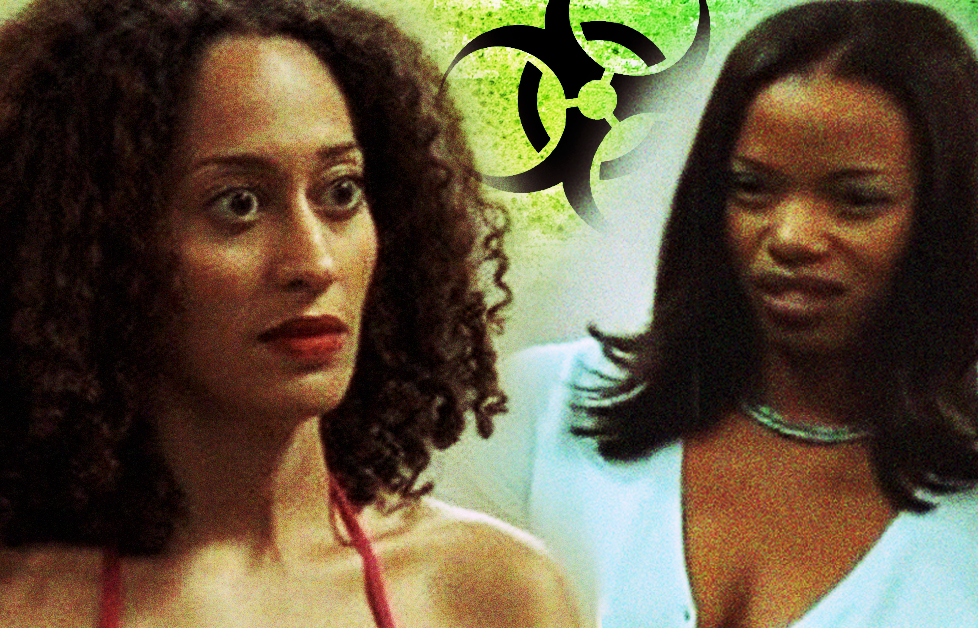‘Girlfriends’ life lessons are still relevant today, including Joan and Toni’s toxic friendship
There’s a lot of debate over whether Toni Childs or Joan Clayton is the worst girlfriend, but the truth is ― it’s a tie.

There’s a lot of debate over whether Toni Childs or Joan Clayton is the worst girlfriend, but the truth is ― it’s a tie.

I had just started puberty when Girlfriends hit the air in 2000. So admittedly, I really couldn’t appreciate the scope of topics the series addressed back then, especially for the time.
Netflix recently resurrected the iconic sitcom, giving new fans a chance to breath fresh perspectives into some of the series’ oldest debates.
It’s the story of four accomplished black women living in California, supporting each other through personal, romantic and career hurdles. In eight seasons, the characters navigate sexuality, marriage, sexism, colorism, racism, balancing work and motherhood, mental health, and friendship — or at least, something resembling friendship.
Honestly, watching the series again as an adult, I’m surprised how many sexual fetishes slid into the show, and I’m baffled at how textbook toxic the women’s relationships with each other are.
There’s a lot of debate over whether Toni Childs or Joan Clayton is the worst girlfriend, but the truth is — it’s a tie. Toni is clearly self-absorbed and vindictive, but Joan isn’t taking home any friendship awards with her constant victim-playing and self-righteous attitude.
It’s a realistic and complicated relationship that has stood the test of time, even in this period when more black women are embracing psychotherapy and emotional wellbeing.
We’ve graduated beyond, as Girlfriends character Maya Wilkes phrased it, “Girl, black people don’t go to therapy, we go to church,” in season two. We can now better dissect what makes the relationship between these two women so dysfunctional.
Binge watching these turbulent friendships has me screaming at my television sometimes. If I were a character on Girlfriends, here’s the advice I would give Toni and Joan.
Toni is already breaking the cardinal rule of the girl code handbook ― and it’s only the first episode! She is dating Joan’s ex-boyfriend and bringing him to her friend’s birthday party.
It’s a scenario that repeatedly plays out throughout Girlfriends: Joan is constantly slighted by supposedly her best friend, but she can’t find the strength to ditch the relationship.
The women have been best friends since middle school, so it’s understandable that Joan is struggling to let go after having invested so much into the relationship.
Nothing wrong with sentimentalism, but there is an element in Joan’s inward struggle that resonated with me, and that’s negotiating with our instincts. We get caught up in this tit-for-tat perspective about friendship.
You tried to sleep with my boyfriend, and I almost ruined any hopes you had of being with the love of your life…so…we’re even. Friends? Or you completely betrayed my trust, but you’ve supported me in my career goals…so…that balances out.
When we rely on weights and measures in a friendship, we’re not actually measuring the positive influence that a person has on our life and we overlook key elements in being compatible.
There was a close friendship I stepped away from because I realized the other person needed me to be available to them at all times during a period in my life when I was emotionally ― and quite frankly ― physically exhausted.
Plus, we were facing a lot of the challenges in our individual lives, and I was ready to move past them… but they weren’t.
Our friendship ended in an argument. However, I carried lingering regrets for years because they didn’t do anything wrong, and I carried no ill feelings toward them.
I still cherish our friendship, and some days, I reminisce on the good times we had. Despite that, I haven’t gone back into that friendship because a burden was lifted and it allowed me to grow into a healthier person. I’ve become more honest with myself about my emotional needs and have identified toxic behaviors within myself.
That breakup couldn’t happen until I stopped tallying the points and demerits.
Follow us on social media! Find trending Bayou Beat headlines on Facebook, Instagram and Twitter.
1 Comment

Terrible article. You haven’t explained what Joan ever did to Toni. Or how toni had any positive intentions for Joan.